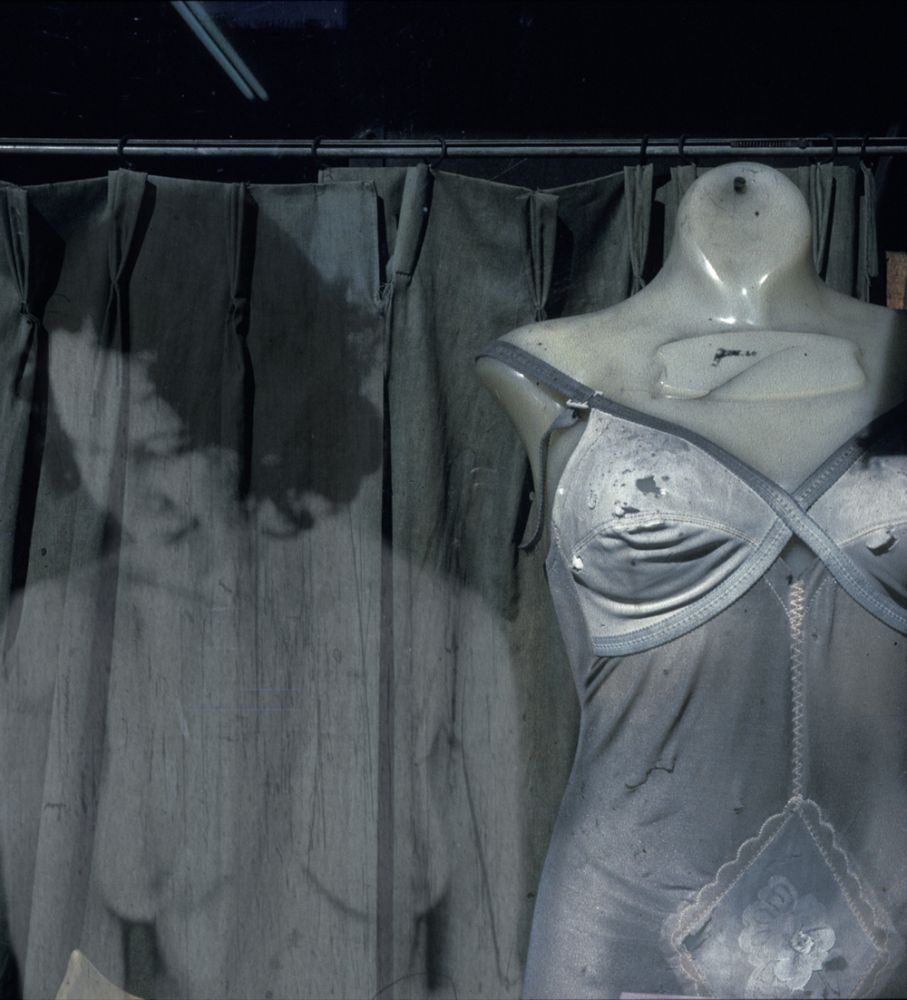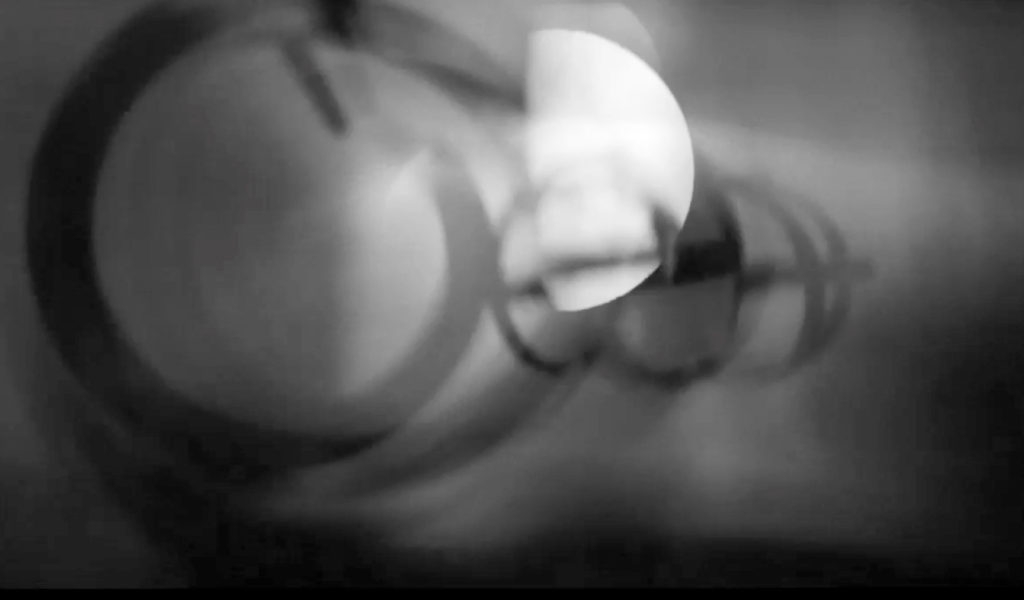Monday August 5, 7:30pm
Scrapbook: Zoe Beloff, Jeanne Liotta
Film performances
We are very pleased to present an evening of film projection performances by Zoe Beloff and Jeanne Liotta as part of our current exhibition “Scrapbook (or, Why Can’t We Live Together)”.
Zoe Beloff’s 1995 Lost employs obsolete equipment — including stereo slide projector, hand-cranked film projector, and sound played via a 78rpm gramophone — to “conjure up the past”, photographing and projecting old films into the dusty storefront windows on the brink of disappearance in her neighborhood of the Lower East Side in New York. This fragile, personal, and partially “lost” film projection experience emphasizes how life and cinema, able to transport us through history and across locations, are deeply subject to time.
Path of Totality by Jeanne Liotta is a “projector performance” for handmade 16mm film and light blocking/refracting objects inspired by her experience of the eclipse of August 21, 2017. Unsatisfied with the inability of photographic imagery to render those particular light conditions, the artist replaces the solar with the projection system in her own personal restaging of the event, bringing the cosmic into the confines of a projection room. Everyday objects such as glasses containing different types of liquids are used to interfere with the sudden, circular beams of light emitted by the projector. The title is a reference to the path of the shadow that appears on the earth’s surface during a total eclipse.
Zoe Beloff
“Lost”, 1995
Performance for stereo slide projector, hand cranked film projector, 78 rpm gramophone, 20 minutes

Image courtesy of Zoe Beloff
New York. The Lower East Side. My neighborhood. To paraphrase Walter Benjamin; a spectacle not of life remembered but of life forgotten. Like dream images these relics are hieroglyphic clues to a forgotten past illuminated at the very moment of its disappearance.
My project for some time has been an attempt to awaken the past buried behind the present, behinds the illusion of progress by studying its scraps and remains, outdated buildings and fashions, the landscape of the everyday that has been discarded, overlooked. And at the same time exploring the ever changing relationship between technology, imagination and perception.
In this work, archaic home entertainment devices disrupt the seamlessness of conventional cinematic viewing, foregrounding the function of all machines of mechanical reproduction, that of the artificial resurrection of the dead. They are literally “time machines”. Cinema, a time machine of movement frame by frame awakening forgotten fantasies. Stereo photography bringing about the artificial reconstruction of space. Here the storefronts with their dusty mannequins and crumbling draperies, referencing even earlier forms of entertainment, the diorama and the waxwork museum. While the scratchy 78’s cough up the voices of those long departed. “Cohen on the Telephone” a classic Jewish comedy sketch from the nineteen twenties marks the strangeness of the voice severed from the body that haunted listeners of an earlier era. – ZB
Jeanne Liotta
“Path of Totality”, 2017
Live 16mm film performance, handmade 16mm film, various everyday objects, sound, 30 minutes

Image courtesy of Jeanne Liotta
A live projection performance for one handmade 16mm film loop and everyday objects, is a series of light and dark gestures produced from the memory of the total solar eclipse event of 8.21.17. Soundscape by the band of poets: Eric Baus, Phil Cordelli, and Oren Silverman, originally performed live. – JL
“…The sky snapped over the sun like a lens cover. The hatch in the brain slammed. Abruptly it was dark night, on the land and in the sky. In the night sky was a tiny ring of light. The hole where the sun belongs is very small. A thin ring of light marked its place. There was no sound. The eyes dried, the arteries drained, the lungs hushed. There was no world. We were the world’s dead people rotating and orbiting around and around, embedded in the planet’s crust, while the earth rolled down. Our minds were light-years distant, forgetful of almost everything. Only an extraordinary act of will could recall to us our former, living selves and our contexts in matter and time. We had, it seems, loved the planet and loved our lives, but could no longer remember the way of them. We got the light wrong. In the sky was something that should not be there. In the black sky was a ring of light. It was a thin ring, an old, thin silver wedding band, an old, worn ring. It was an old wedding band in the sky, or a morsel of bone. There were stars. It was all over…” — Annie Dillard, “Total Eclipse”, first published 1982 in “Teaching a Stone to Talk”
General admission $10
Students & Members $8
_
Zoe Beloff grew up in Edinburgh, Scotland where she studied painting and drawing. In 1980 she moved to New York to study at Columbia University where she received an MFA in Film. She is an artist and filmmaker. Her projects often involve a range of media including films, drawings and archival documents organized around a theme. They include proposals for new forms of community; “The Coney Island Amateur Psychoanalytic Society and its Circle 1926 – 1972” and “The Days of the Commune”, projects that explore relationships between labor, technology and mental states in “The Infernal Dream of Mutt and Jeff” and “Emotions go to Work” as well as the exploration of the origins of cinema from a feminist perspective in “Charming Augustine” and “Shadowland or Light from the Other Side”. Her current work address the relationship between American fascism in the 1930’s and its resurgence today. These new works “Exile”, “the Parade of the Old New” and “Between Worlds” focus on the status of the refugee and the undocumented in New York City and beyond. Both thematically and formally Beloff draws timelines between past and present helping us to imagine a future against the grain of reactionary ideology. She aims to make radical art that educates, entertains, and provokes discussion. Most importantly, as her work attests, she believes protest should be vibrant, humorous and colorful, a carnival of resistance to light the way in dark times. Beloff’s work has been featured in international exhibitions and screenings; venues include the Whitney Museum Biennial (1997 and 2002), Site Santa Fe, the M HKA museum, in Antwerp, Belgium and the Pompidou Center, in Paris, France. She enjoys working in alternative venues that are free and open to the community for events and conversations such as The Coney Island Museum, Participant, Momenta and The James Gallery at the CUNY Graduate Center. She has been awarded fellowships from The Graham Foundation, the Guggenheim Foundation, The Foundation for Contemporary Arts, The Radcliffe Institute at Harvard and the New York Foundation for the Arts. She is a professor at Queens College CUNY.
Jeanne Liotta works in film and other mediums with thematics often located at the intersection of art, science, natural philosophy, and ephemerality. Her most known 16mm film of the night skies, “Observando El Cielo”, received numerous awards including the Tiger Award at the Rotterdam International Film Festival, and was voted among the top films of the decade by The Film Society of Lincoln Center. In 2013 Anthology Film Archives presented “The Real World At Last Becomes a Myth”, a complete retrospective of her works in film and video, and in 2014 she received a commission to work with NOAA climate scientists in Boulder, CO to create 360-degree media for Science on a Sphere. Her “one-cut” collages “The Tiffany One-Cuts” culled from pages of the New York Times were incorporated into installations by artist Nancy Shavers at Derek Eller Gallery (2016) and La Biennale di Venezia (2017). Liotta’s works have also previously been exhibited at The Contemporary Austin – Jones Center, Austin, Texas; The Museum of Contemporary Art Denver, Denver, Colorado; Inova Institute of Visual Arts, Milwaukee, Wisconsin; The Camera Club of NY, New York; Songs for Presidents, Brooklyn, NY; and the Halle für Kunst und Media, Graz, Austria among others. Her films have been presented at the Whitney Museum of American Art (including the Whitney Biennial 2006); the New York Film Festival; Rotterdam International Film Festival, Rotterdam, The Netherlands; Ann Arbor Film Festival, Ann Arbor, Michigan; Cinémathèque Française, Paris, France; Haus der Kulturen der Welt, Berlin, Germany; CCCB, Barcelona, Spain; The Exploratorium, San Francisco, CA; The Wexner Center for the Arts, Columbus, Ohio; Machine Project, Los Angeles, CA; and The Menil Collection, Houston, Texas, among others. Awards include NYSCA, The Jerome Foundation, The Museum of Contemporary Cinema and The Orphans Film Symposium’s Helen Hill Award. Liotta has been a resident at the Experimental Television Center and a MacDowell Colony Fellow. She has also maintained ongoing research, programming and lecturing on The Joseph Cornell Film Collection at Anthology Film Archives, and has written a monograph on Cornell’s films published by The San Francisco Cinematheque for the traveling exhibition “Navigating the Imagination”. She is presently Associate Professor in Film Studies at The University of Colorado Boulder, and Co-chair of Film/Video at the Bard MFA Program. Jeanne Liotta lives and works between New York and Boulder, Colorado.
_
Microscope Gallery Event Series 2019 is sponsored, in part, by the Greater New York Arts Development Fund of the New York City Department of Cultural Affairs, administered by Brooklyn Arts Council (BAC).
